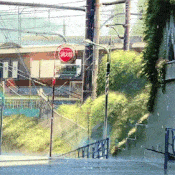|
Shbobdb posted:Don't buy into the propaganda that you need a suburban mcmansion to be happy.
|
|
|
|

|
| # ? May 26, 2024 16:45 |
|
Yeah it's definitely true that people's "requirements" for space have grown dramatically. IIRC compared to the 50s average house size has like doubled even as average household size has decreased. I think the biggest reason "apartment living" sucks for families with kids is just that urban design/land use in the US is generally garbage. We were living in these apartments in a really big complex on Mercer Island (near Seattle) that has this old GI housing with...it's hard to describe exactly, but the landscaping is really nice, lots of greenery, and the amount of road space where cars go is limited, and the complex as a whole has a bunch of buildings with a moderate number of units rather than megablocks. Anyway, it was fantastic for kids, lots of space to run around in, kids running around by themselves because it was safe and easy and comfortable to reach other families. Here it is if you want to see what I'm talking about : https://www.google.com/maps/place/S...!4d-122.2197407 In most parts of the US, most apartments are in these big blocks that have only small amounts of green space, and the surrounding environment is pro-car and anti-walking, so you feel really hemmed in, it's bad in general but especially for kids. So it's not surprising that people really want homes with a (big) backyard when the alternative is living on a little island in a lovely asphalt ocean.
|
|
|
|
It's not just that, it's also space for other things. If both parents commute to work, can they count on having parking spaces close by? Are they going to have to trudge groceries, babies and other stuff up and down three flights of stairs? Does their place fit a washer/dryer or did do they have to use a laundromat? Homeownership also is tied to generational wealth and stability. When I was renting I moved six times in five years (sucked) but I plan on staying in my house for decades.
|
|
|
|
Given how rent control works, if you moved five times in six years you are bad at renting. That might be part of your problem.
|
|
|
|
Rent control in the Bay area is much less common than you think. Especially when it's renting a 10x10 room rented out by a homeowner or subletter.
|
|
|
|
Rent control should be able to be applied to single family units.
|
|
|
|
Shbobdb posted:Human beings for most of recorded history have lived in spaces smaller than modern studio apartments and they had their cows and goats in there with them too. That's great I guess, but I don't particularly care what human beings have been doing for most of recorded history because it's not applicable to my personal preferences and tastes. I dislike apartment living and - in my opinion - would move out of state to find cheaper housing vs renting even a fairly large apartment in the Bay Area. If you disagree with that it's fine, but it's not "buying into propaganda" if I'd rather have a house. Cool your loving jets, yeesh. 
|
|
|
|
Many areas recently voted against it. Mountain View, for example, home of Google, voted against rent control. There's quite a lot of apartments, though you get one company that owns huge swathes of them so it's hard to shop around, new condos and apartments recently built are mainly catering to high income earners. I've heard their going to convert parts of Moffett field into housing, but we'll see how that goes. If it's as toxic and inaccessible as living on Treasure Island then maybe that will make it affordable.
|
|
|
|
Panfilo posted:Mountain View, for example, home of Google, voted against rent control. No it didn't? 
|
|
|
|
Sydin posted:That's great I guess, but I don't particularly care what human beings have been doing for most of recorded history because it's not applicable to my personal preferences and tastes. I dislike apartment living and - in my opinion - would move out of state to find cheaper housing vs renting even a fairly large apartment in the Bay Area. If you disagree with that it's fine, but it's not "buying into propaganda" if I'd rather have a house. Cool your loving jets, yeesh. Another thing for people to consider is the main expense of living in these areas is mainly due to land. It's not like these houses are built is gold bricks and diamond aggregate patios. So if you've already paid a lord of money for the space, why build a tiny shack there? The cost of building a big house won't be that much more when you factor how much the land already cost. While I see the point of environmental sustainability of higher density living, the cynic in me feels like promoting Tiny Houses and apartments will just let landlords jack the rent up even more. My in laws had a renter that was illegally Subletting to 7 families at the time, and it was not a good deal for them (a family of 4 was paying $700 to live in a 10x10 mildew riddled room)
|
|
|
|
Rent control is only really common in the city of San Francisco, and it only applies to units older than IIRC 1974. There are still a huge number of rent-controlled units, mind you, but given the prices, the economic pressure on property owners to convert units to non-rent-controlled is absolutely enormous. To the point that it's possibly in an apartment building owner's interest to tear the entire building down and build a new one just to get rid of rent control. People would be a lot happier with renting units to live in if they were built with soundproofing. I rented for years, I know many people who rent, and by far the #1 complaint is having to listen to your neighbors through thin walls all the time. In California we just had to stop building unreinforced masonry construction after 1906, so pretty much all the apartments built since then have just wood frame walls (usually uninsulated) separating units. Back east I imagine way more units have brick walls between them. It's also reasonable to understand that socially, everyone in America is heavily conditioned to view a single family home as a major signal of membership in the middle class. It's not only that people desire more space, they desire to not be a member of the impoverished class, and understandably so. Of course many, many renters are middle class or even wealthy, but the emotional significance of owning a home on a piece of land shouldn't be discounted just because it's not totally rational. It's also the case that often the suburban cities where most housing is single family homes, tends to have better schools. And, (especially rent-controlled) apartments that people can afford instead of a house they can't afford, are usually much older construction: a huge percentage of the single family homes in the bay area were built post-1950, whereas a lot of the apartments in SF and other bay area cities are 30 to 50+ years older. The "cure" to the housing problems the bay area faces is definitely more, denser development, and that means people willing to live in multi-family dwellings. Right now the large majority of such construction is sold or rented to the wealthy, but that's often the case with housing: once those units are 40 years old, many of them will have become less desirable, and more available to people earning lower relative wages. That's not to say that it's totally OK to not build any housing intended for lower rents to begin with, but... it's better to build a high rise full of luxury apartments, than to build nothing at all. And with land prices and highly restrictive building regulations and approval processes that drag out for years, there's zero financial incentive for a developer to build small units targeted at the bottom of the market instead of larger units with luxury amenities targeted at the top of the market. So, cities in the Bay Area have to find ways to promote development despite the vested interests of the current property owners, who want to preserve their property values. San Francisco in particular simply cannot pretend that the demand will go away; many old neighborhoods full of attractive two and three story houses need to be replaced by ten or twelve story apartment buildings, regardless of historic value or neighborhood character. The only real alternative to densification is to see the city continue to transform into an enclave for the very wealthy, with an enormous daily migration of the working class service providers for those wealthy residents into and out of the city on over-capacity transport systems that make them all miserable, paid whatever minimum wage is necessary to just barely retain the supply of required labor. Unfortunately that arrangement is pretty attractive to the current landowners in San Francisco, and they continue to assert an outsized influence on the city's building policies. We've seen some big highrises go up and there's a lot of renovation going on in the city, tons of OMI evictions, there's new units going in, but... it's not yet at a scale or pace sufficient to reverse the upward trend in home prices, and that means the rate probably needs to at least double.
|
|
|
|
b0lt posted:No it didn't? I was mistaken, I thought measure V didn't pass. I probably got Mountain View mixed up with another city that didn't pass it (it was on the ballot in a few other cities at the time as well).
|
|
|
|
Aeka 2.0 posted:Some of my co workers give me poo poo for only being able to afford to live out in the IE instead of orange county where my job is, but I have a feeling at least one of them will have to move out my way. And now it seems my area is starting to be gentrified. It was the same with me. I moved out to the IE in 2011 because we were priced out of OC. Last year, two of my brother-in-law and sister-in-law both made the move as well. After 6 years of living out here I actually prefer it to OC now. Bigger house, tons of hiking trails and outdoor stuff to do. Good school district at an affordable price. It's hotter and the commute sucks (luckily I work 3rd shift) but it's quite enjoyable.
|
|
|
|
It'd be nice if some of the pleasantries of coastal living could be extended inland (like, say, jobs and infrastructure). There's no reason everyone has to live on the coast, but my experience with IE is that it's hot, ugly, and full of cheap commercial districts.
|
|
|
|
Panfilo posted:While I see the point of environmental sustainability of higher density living, the cynic in me feels like promoting Tiny Houses and apartments will just let landlords jack the rent up even more. My in laws had a renter that was illegally Subletting to 7 families at the time, and it was not a good deal for them (a family of 4 was paying $700 to live in a 10x10 mildew riddled room) Ultimately allowing more housing is going to put competitive pressure on landlords to lower rents. After all, the only reason they could raise it in the first place so much was because demand (especially in tech boom areas) rapidly outpaced supply, so the obvious solution is to increase supply. Landlords can't arbitrarily raise rents to whatever they want, the reason rents are higher in California isn't that Texans are less greedy than Californians, they can raise the rent to what people are willing to pay, which is determined by how much money they have and what other options are available. More options (good transit is also very helpful here) means less leverage for landlords. And besides higher densities being better for the environment, there's also the classism and inequality issue to consider. A huge reason for why different school districts in the same city/metro in the US can have huge differences in quality is that large minimum lot sizes exclude the poor and working class from being able to afford to live in a certain area, so you end up with strong economic segregation. I live in Munich now and part of why there seems to be less drastic differences in wealth between neighborhoods is that while there are still single-family homes around, there's multifamily housing in seemingly every neighborhood. The way so many Americans treat super-low-density single-use zoning and car-dominant design as this sacred cow is horrible for the country, and especially so for issues that progressives care about. Cicero fucked around with this message at 23:49 on Oct 20, 2017 |
|
|
|
Cup Runneth Over posted:It'd be nice if some of the pleasantries of coastal living could be extended inland (like, say, jobs and infrastructure). There's no reason everyone has to live on the coast, but my experience with IE is that it's hot, ugly, and full of cheap commercial districts. There's a lot of medical offices and some tech businesses out in Redlands, Ontario, and Rancho Cucamonga, but I do wish there was a larger tech-focused industry somewhere out here. IE is still booming like crazy and it's mostly families and first-time buyers right now so it's a possibility, but who knows. IE still has a real bad stigma that seems to keep certain industries away. FCKGW fucked around with this message at 23:51 on Oct 20, 2017 |
|
|
|
When I went on vacation in summer I stayed at a 2k-sqfoot house that felt as functional and spacious as some much larger houses. The lot was also smaller but was really laid out well. And the neighborhood was very appealing. I think a target squarefootage and lot size misses the point. Now obviously square footage is important to a degree but really the layout of your neighborhood + what's in walking distance + floorplan matters a lot. Much more than I would have thought when I started buying 20 years ago. And the tiny house thing is so loving depressing to me. I mean, if that works for you, great. If it's what you want, great. If you're being forced into it...yikes. FCKGW posted:There's a lot of medical offices and some tech businesses out in Redlands, Ontario, and Rancho Cucamonga, but I do wish there was a larger tech-focused industry somewhere out here. Riverside has busted its rear end for the last 5 years to get tech investment and has almost nothing to show for it. I know a couple of people who work for the city and they go to every conference, make a zillion pitches, and press a lot of flesh and nobody cares. It's like trying to make your town into the next Hollywood: the talent and decision makers already have their designated area and momentum keeps it going from there. IMO. Also IE prices are loving nutso again, at pre-crash 2008 levels or higher, I honestly don't think it's sustainable and am girding myself for another plummet.
|
|
|
|
Megaman's Jockstrap posted:Also IE prices are loving nutso again, at pre-crash 2008 levels or higher, I honestly don't think it's sustainable and am girding myself for another plummet. We've had a decade+ of lost growth of housing prices, it's just getting back to where it would have been had the crash not happened. It's not an indicator of anything. IE is still lagging behind OC and LA in home prices vs. peak bubble.
|
|
|
|
Well that's true but I honestly felt the prices even in 2006 were pretty wild and over-valued vs. what people were actually making. So 2008's valuation of 500k on my 1.6k sq ft tract home was just completely nuts. Something interesting is that when these boomers start dying the only thing that is going to have the money to buy their houses at "market value" will be hedge funds. It certainly ain't gonna be millennials, at least in my experience. Very bad situation IMO. edit: I just checked and the valuation was even insanely higher than I remember. Jeeez. Megaman's Jockstrap fucked around with this message at 00:25 on Oct 21, 2017 |
|
|
|
Sydin posted:That's great I guess, but I don't particularly care what human beings have been doing for most of recorded history because it's not applicable to my personal preferences and tastes. I dislike apartment living and - in my opinion - would move out of state to find cheaper housing vs renting even a fairly large apartment in the Bay Area. If you disagree with that it's fine, but it's not "buying into propaganda" if I'd rather have a house. Cool your loving jets, yeesh. TBF, the fact that I wasn't born a patrician and have to actually work is against my taste. I agree with what you are saying. But, so what? Unless you are going full Nozic's response to Rawls and want people to be poor as gently caress.
|
|
|
|
Leperflesh posted:The "cure" to the housing problems the bay area faces is definitely more, denser development, and that means people willing to live in multi-family dwellings.
|
|
|
|
^ A good post. There is a lot to love but people flock here for the same reason Dillinger robbed banks -- it's where the money is.
|
|
|
|
We need some FDR esque public works program to fix our crumbling infrastructure, especially in the wake of a devastating hurricane season.
|
|
|
|
Panfilo posted:We need some FDR esque public works program to fix our crumbling infrastructure, especially in the wake of a devastating hurricane season. Unfortunately, that's socialism -- and not the good, nationalistic kind we like in this country nowadays 
|
|
|
|
Cicero posted:Landlords can't arbitrarily raise rents to whatever they want... The whole loving thing is serfdom, in your rent check memo field just right, "In Homage to the Lord of the Lands!"
|
|
|
|
The other part of it is that as a Renter you have little recourse outside your lease agreement (and even then it is up in the air, as there are no shortage of people in disputes with their Landlords over lovely things they do). When I was in my 20s instead of renting an apartment I would just rent a room in a house. This seemed like a better deal at the time, since I could pay $500 vs $1200, and share access to a kitchen, backyard, living room, etc. But it was during the previous housing bubble and what kept happening was that the owners kept selling the house everybody was renting in, forcing them to find other places to live. It happened to me three times. Had I been a homeowner at the time, I would have the power to dictate whether I wanted to keep living there or not while I was able to afford it. But as a renter I did not get that choice, my landlord did. I also lived in an in-law unit right around when they started getting popular in the area. Up until that point, in-law units weren't as common because it was sometimes cheaper for the homeowner to simply convert his place into a 'duplex' providing the tenant with his own entrance, kitchenette, bathroom, and shared laundry room. The Landlord lived in the 'main' part of the house, or sometimes rented it out to another family. But as these got popular, so did the rents for them. What you used to pay for a studio/1bedroom apartment they were charging for an in law unit, and what they used to charge for an in law unit they were charging for the 10x10 rooms I used to live in over a decade ago.
|
|
|
|
I lucked into a below market rate apartment when I moved out to the bay, right at the tail end of the dotcom boom. I held the lease and rented out the 2nd bedroom via craigslist. I had the advantages of rent control and the control of the landlord over how the place was run and who stayed. I ended up paying about $500 more or less. Those same apartments are now renting at $2880. I like apartments tbh. Iím not handy and I donít like wasting my weekends at loving Loweís. Iíd rather have a communal gardener and a manager I can call when poo poo breaks in the apartment. I grew up in apartments. Having a community of kids nearby was fantastic as was having community benefits like a pool and a playground. Something none of our families could have afforded on our own.
|
|
|
|
That's cool. The only person I know that lives in a rent-controlled apartment is a friend of my wife who lives in San Francisco. She got an amazing deal; beautiful view and a block away from a BART station. Granted the building is very old and the bathroom is extremely cramped (feels like the bathroom was the barely breadth of my shoulders) but the view faces green space not concrete or the back of another apartment building. She's fortunate in that a few years back she got disabled to the point of being unable to continue working her job, but is currently on a fixed income that is high enough to cover the rent for the time being. She's currently going through a stressful time because she's in the middle of a messy divorce and I have no freaking idea how you split up a rent-controlled apartment. Rent control is a godsend for so many people. The people that live under rent control still continue to live in the area, contribute to the economy with what little money they have, and get some semblence of stability. In contrast, in places like Palo Alto these same people are all crammed in the only trailer part still operating in the city, and under constant threat of the landowner selling. If those people eventually do get forced out, it will be impossible for people on fixed incomes to realistically afford to live in the Penninsula, as most people won't live long enough to get their turn on the wait lists for section 8 or senior housing 
|
|
|
|
cheese posted:Actually, a really good "cure" to the bay area housing problem would be if the bay area wasn't one of the few places in the country to find an ever growing supply of well paying professional jobs. Bay area weather is nice and its enjoyable living in a more tolerant, "liberal" area, but people want to live in the bay area because the jobs are here. Maybe addressing what feels like a shrinking nationwide pool of good middle class jobs would be a good idea? In any case, even if you did want to shift jobs around, it'd still make sense to increase allowed density in the bay area (and also everywhere else in the country) since it's still better for the environment and reduces economic segregation/social inequality. Cicero fucked around with this message at 02:25 on Oct 22, 2017 |
|
|
|
cheese posted:Actually, a really good "cure" to the bay area housing problem would be if the bay area wasn't one of the few places in the country to find an ever growing supply of well paying professional jobs. Bay area weather is nice and its enjoyable living in a more tolerant, "liberal" area, but people want to live in the bay area because the jobs are here. Maybe addressing what feels like a shrinking nationwide pool of good middle class jobs would be a good idea? Some of us live here because we grew up here and all of our family and friends live here. Also we lost thousands of jobs last month prepare your bubble holes techlords
|
|
|
|
Yeah, a huge part of the problem in California is that Bay-LA Democrats and SoCal Republicans have had an outsized impact on state housing/jobs policy for decades and an awful lot of people in both parties are in bed with developers and big business. A lot of these policies have been dressed up as "tax relief," "homeowner protection," "urban renewal," "job creation," or whatever but the general trend has been to raise/protect property values and bring jobs to places that are already affluent (and thus more influential) while shifting costs onto the younger generation and people living at the periphery. The lack of urban planning and public transit in most of the state is symptomatic of the power imbalance between the urban wealthy and everyone else. If I were running the state, I'd focus on investing in and building up mid-sized peripheral cities like El Centro, Oxnard, Fresno, Paso Robles, Salinas, Chico, Santa Rosa, Eureka, etc., so that we had more than just three urban cores (four counting Sac) to work from and more Californians could actually live in their own place instead of a suburb of somewhere else. People like me don't usually get elected though and a lot of the politicians in those smaller cities actually enjoy their big fish-small pond parochial status.
|
|
|
|
The tech companies themselves are largely YIMBY though, because insane housing prices make it harder to recruit people from other parts of the country. And I'm pretty sure developers would love to increase the allowed supply of housing and build a shitton more, not keep everything static. Maybe it was different in the past, but it seems like the status quo is mostly defended by old white landowners who want their neighborhoods frozen in amber, who may call themselves progressive but are allergic to dreaded undesirables and especially to anything that might hurt their precious parking. Also people on the left seem to have a reflexive distaste to tearing down anything old, which is fine and good when it's nature you're talking about, or a building that's actually historical, but then it ends up getting applied to even like parking garages and random nothing-special housing.
|
|
|
|
For the jobs that are able, would the state government encouraging telecommuting be of benefit? Or does it already and I donít know about it? And not just encouraging employees to work from home, but to have some distance from the central office (100 miles?), yet still reside within the state. ...maybe thatís just a terrible idea.
|
|
|
|

|
|
|
|
Duckbox posted:If I were running the state, I'd focus on investing in and building up mid-sized peripheral cities like El Centro, Oxnard, Fresno, Paso Robles, Salinas, Chico, Santa Rosa, Eureka, etc., so that we had more than just three urban cores (four counting Sac) to work from and more Californians could actually live in their own place instead of a suburb of somewhere else. People like me don't usually get elected though and a lot of the politicians in those smaller cities actually enjoy their big fish-small pond parochial status. Eureka is really out of the way and can be hard to access. They could hold more people but the ~3 hours drive from Santa Rosa (which means 4+ from SF) on winding mountain-ish roads is going to hold them back unless teleportation is invented. Santa Rosa kinda does fall into what you're talking about but from people "in the know" the older group that wanted to put the city under glass has retired/died and the city is more aggressively trying to figure out how to solve their housing crisis. The bigger issue for SR is that about 20 years ago they were a much more "edge" town than the weird rural/wine-beer-tourism/county seat nexus they are now, and simply weren't prepared to manage the necessary growth. Someone who's lived in SR since the 90s and has 20 years of time in planning or whatever is just not likely to understand that their city has gained ~40,000 residents, and that seemingly good (or passable) development laws in 1997 are dire for 2017. They also probably look at the nearest towns like Sonoma (~11k), Rohnert Park (42k), Petaluma (60k), and Sebastopol (7k) and think "we're just a bigger version of that", instead of realizing that the population is more like all of those put together and times 1.7. Zachack fucked around with this message at 06:51 on Oct 22, 2017 |
|
|
|
HelloSailorSign posted:For the jobs that are able, would the state government encouraging telecommuting be of benefit? Telecommuting is allowed but a lot of non-Sacramento state jobs tend to revolve around geographic regions. IT tends to be a crapshoot, too, so certain telework concepts, uhhh, may not work or be disabled. And Sacramento isn't outrageously expensive so in my very limited experience there tends to be a gravity well effect where the very higher ups (who kinda have to be in Sacramento) want their underlings to be in Sacramento and aren't thrilled with telecommuting. Also in my limited experience a lot of the types of jobs that lend themselves to telecommuting are ones where you get called into meetings a lot and that iffy IT support can really gently caress with that.
|
|
|
|
HelloSailorSign posted:For the jobs that are able, would the state government encouraging telecommuting be of benefit? Why would you live 100 miles away when you could live in Washington and not pay income tax?
|
|
|
|
Zachack posted:Fresno has a higher population than Sacramento, although I'm not sure if the very-quick google numbers I saw represent the Sacramento metro region (like Rancho Cordova) or just the city. No one wants to be there, though, because it's boiling hot and aside from produce it's not really close enough to fun stuff other than Yosemite (and that's still ~2-3 hours). It's not a total shithole from the little I've seen - it has "stuff"- but I've heard "at least I don't live in Bakersfield" a few too many times from people living there. The big issue with central valley or deep IE or Redding etc is that the weather gets really bad. Really, really bad. And that means certain times of the years some things just don't get to happen outside, and there really isn't anything to counter-balance that. Like, Tahoe gets freezing cold and snow, but snow can actually be fun. I don't know how 115F and ag stench becomes fun. Fresno is bigger than Sacramento, but its metro area is about a million to Sacramento's 2.2 mil. Sac has way more of a "big city" feel. Fresno gets stupid hot in the summer, but Sacramento is almost as bad. It just has a little bit more shade. Fresno is sort of the unofficial capital of the Central Valley and is in the dead center of the state. It would be a logical place to have the state capital if it weren't, you know, Fresno. The area south of it is really loving empty (I pity anyone who runs out of gas in the vicinity of Coalinga), but there are a lot of little cities on the 99 like Visalia, Madera, and Merced that are only like an hour's drive. If high speed rail ever happens, the Valley could get a lot more connected. The Inland Empire and Imperial Valley are definitely hot as balls and the Central Valley isn't much better, but that doesn't explain why the Central Coast is so underdeveloped. The weather from Santa Barbara to Santa Cruz is loving gorgeous, but it's weirdly depopulated compared to SoCal and the Bay and I really can't figure out why. As for NorCal, I don't think the weather in places like Redding and Chico is really that bad. It gets a little frost, but it's nothing compared to living somewhere actually cold. I think it's mostly just a matter of where the jobs and infrastructure are. I lived in Humboldt County for a couple years and the weather was fine (if wet), but the economy is barely kept alive by lumber, tourism, and pot farming and there's so much poverty and crime that it's really hard to imagine building a life there. Also the 101 isn't really in the mountains, it's just kinda circuitous and not very well maintained. The state could do a lot more to help, but they apparently don't give a poo poo.
|
|
|
|
The only good thing about Fresno is that it's "close" to Sequoia/Kings Canyon National Parks. Also, CEO's/Execs want to live in the Bay Area and demand in person-meetings a lot, so only back office stuff will ever go to the Central Valley. Ever.
|
|
|
|

|
| # ? May 26, 2024 16:45 |
|
Redding gets up to 114+ degrees in the summer and if you live anywhere off I-5 more often than not you have to evacuate due to wildfires that burn through the area from time to time.
|
|
|



























